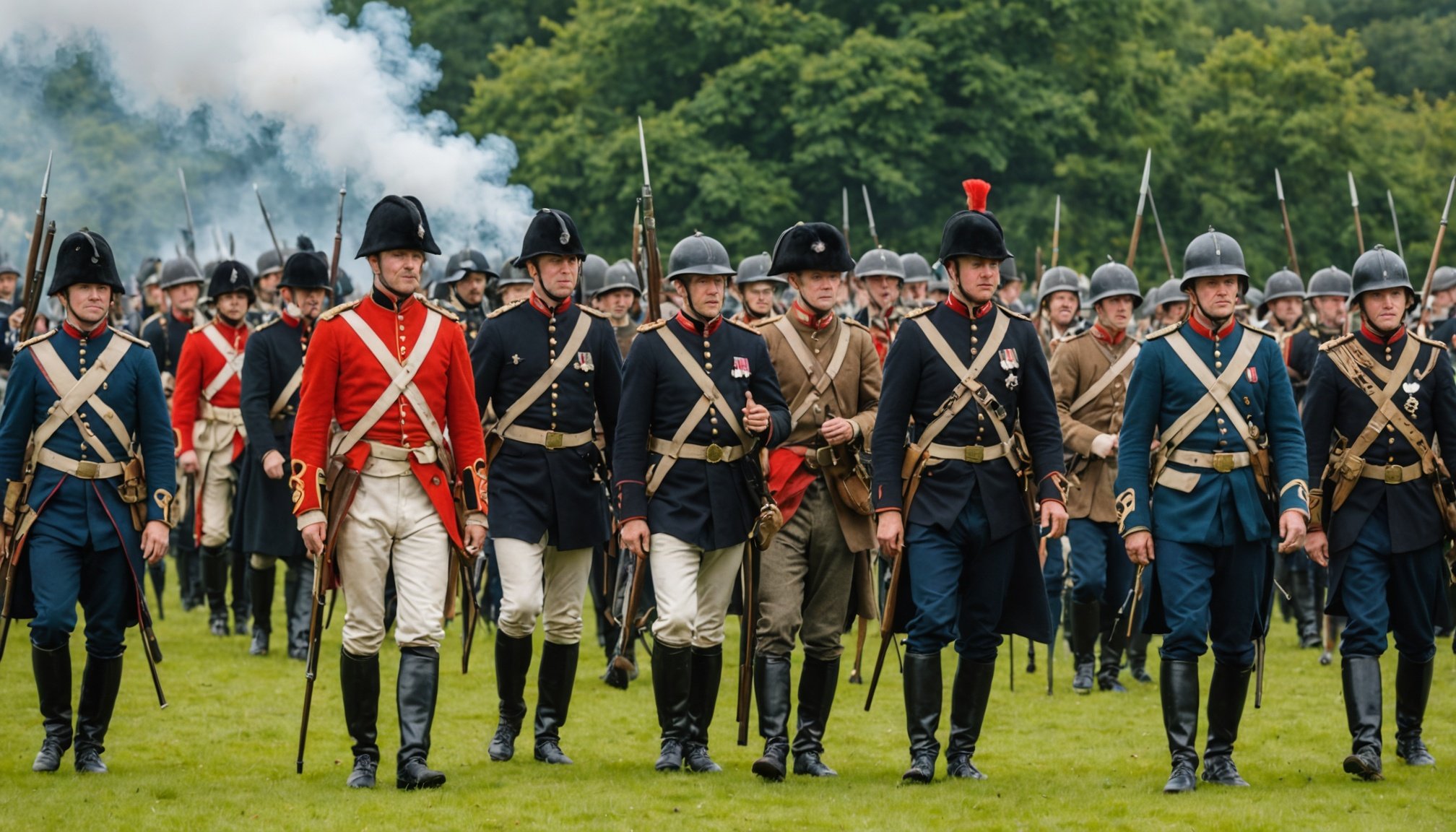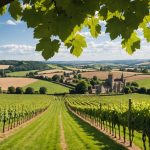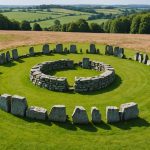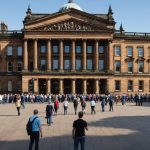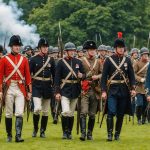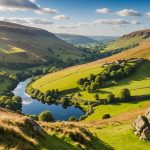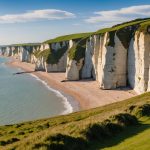Overview of Historical Reenactments in the UK
Historical reenactments in the UK offer a compelling glimpse into past events, capturing the essence of various periods through detailed portrayals. These UK events serve both cultural and educational purposes, bringing history to life for participants and audiences alike. They recreate historical contexts ranging from the Roman Empire to the Industrial Revolution, showcasing the diverse tapestry of British heritage.
The cultural significance of historical reenactments is profound. They provide an immersive experience where people of all ages can engage directly with history. This immersive approach enhances learning opportunities beyond traditional methods, making history accessible by demonstrating the daily lives, conflicts, and cultures of bygone eras.
Also read : Discover London’s Literary Legacy: Dive into the Rich History of Literature with Captivating Guided Tours
Although often seen purely for entertainment, these reenactments have an educational undertone, illustrating the impacts of significant historical events. Education is augmented through hands-on experiences that deepen the appreciation of history, fostering a greater understanding of the origins and development of modern society.
In summary, these reenactments are not only about spectacle; they serve a crucial role in preserving history, promoting cultural heritage, and offering an interactive method for education that resonates with audiences both young and old.
Also to see : France travel guide: your essential 2025 planning companion
Types of Historical Reenactments
Historical reenactments celebrate various types of reenactments across different eras and themes, each offering unique perspectives on the past. These activities can range from the Medieval Period, featuring knights and castles, to detailed World War scenarios that delve into the complex history of the 20th century.
Medieval Reenactments
Medieval reenactments captivate audiences with grand displays of chivalry, archery demonstrations, and mock battles that recreate the Middle Ages’ dynamic social hierarchy. Participants often engage in role-playing as knights, lords, or peasants, showcasing their skills in crafts and combat. These reenactments provide insight into medieval life through authentic costumes and settings.
World War Reenactments
World War reenactments offer profound experiences, shedding light on the historical significance of these global conflicts. They frequently include tactical displays, educational talks, and period equipment exhibits. Involvement in these reenactments facilitates greater public understanding of wartime realities and sacrifices made by soldiers and civilians alike.
Victorian Era Events
Victorian-era events focus on the elegance and societal shifts of the 19th century. Often represented through themed teas, dances, and theatrical performances, these events immerse participants in the distinct culture and innovations of the time. Victorian reenactments highlight evolving fashion, technological advancements, and societal norms, offering educational experiences for enthusiasts of all ages.
Notable Historical Reenactment Events in the UK
Historical reenactment events across the UK draw enthusiasts and spectators eager to experience history firsthand. These reenactment festivals highlight significant historical fairs that capture diverse historical periods and locations.
One of the most prominent annual events is the Battle Prom Concerts, blending classical music with historical battles reenactments. Another standout is the Medieval Festival in Herstmonceux, boasting jousting displays and authentic medieval marketplaces. Meanwhile, the Sealed Knot Society frequently hosts English Civil War reenactments, famed for its dedication to historical accuracy.
Each area of the UK has unique regional variations, reflecting its rich heritage — Northern events might focus on Viking history while the South embraces Roman historical contexts. These festivals benefit local communities by boosting tourism and fostering cultural pride. Local businesses often experience an economic uplift during these events, as visitors explore their towns alongside history.
The participatory nature of these events, alongside the vibrant marketplaces and demonstration zones, offers an engaging avenue for learning and celebrating history. Engaging with these festivals provides immersive insights into the UK’s past, encouraging community integration and education.
Roles of Participants in Reenactments
Participants play diverse roles in historical reenactments, each contributing to the overall authenticity and success of UK events. These roles can generally be divided into three main categories: actors and performers, support roles, and those focusing on historical accuracy and training.
Roles for Actors and Performers
Actors and performers typically take center stage, embodying historical figures with flair and precision. Their responsibilities include learning scripts, rehearsing battles, and mastering era-appropriate accents and mannerisms. For example, portraying a knight in a medieval reenactment involves understanding both the social etiquette and combat techniques of the time.
Support Roles: Organizers and Creatives
Support roles are equally crucial, encompassing organizers, costume designers, and set builders. These individuals work behind the scenes to ensure events run smoothly and visually capture the essence of different periods. Creatives often meticulously research and craft historically accurate costumes and props, while organizers handle logistics and event coordination.
Historical Accuracy and Training
Maintaining historical accuracy is paramount, requiring training in traditional crafts and customs. Reenactors often attend workshops to enhance their skills, such as blacksmithing or period dance. This skill development helps maintain standards and enriches the educational impact of reenactments for both participants and audiences.
Preparing for Historical Reenactments
Historical reenactments require careful preparation, ensuring participants embody their roles authentically and events unfold smoothly. A significant part of this preparation involves obtaining the right gear and costumes. Each reenactment era, whether it be medieval or Victorian, demands historically accurate attire crafted from period-appropriate materials. Costumes should reflect societal roles, such as knightly armour or Victorian dresses, enhancing the historical ambiance.
For first-time participants, preparation tips include immersing oneself in the historical context of their role. This can involve studying character backgrounds and practicing typical era-specific activities to ensure a genuine portrayal. Participants should also familiarise themselves with information and rules provided by event organisers.
Sourcing authentic materials can be crucial. Several resources exist, including specialist stores and online suppliers offering replicas and vintage items. These materials not only boost the authenticity of reenactments but also contribute to the cultural value conveyed to the audience.
Engaging in preparation not only ensures individual readiness but enriches the overall event participation experience. Aspiring reenactors should consider joining workshops or training sessions, which provide valuable insights and skills necessary for successful reenactment participation.
Resources and Communities for Reenactors
Historical reenactments in the UK thrive with the support of diverse reenactor communities and rich resources offering enthusiasts a sense of camaraderie and education. These groups bring together individuals passionate about reliving the past to share insights, tips, and ideas, facilitating an engaging environment for newcomers and veterans alike.
Online Forums and Groups
Online forums and groups form an essential backbone for reenactors. Platforms like Facebook and Reddit host dedicated spaces where enthusiasts exchange advice on costumes, tactics, and event news. These digital communities allow for the dissemination of information rapidly, offering a space for questions and collaborations.
Local Organizations and Clubs
Many local organizations and clubs act as physical hubs for reenactors, often serving as the heart of a reenactment community. These clubs arrange regular meetings, practice sessions, and social events, allowing members to exchange know-how and experiences.
Workshops and Training Resources
Workshops provide training resources critical for enhancing skills like sewing authentic costumes or mastering battle formations. Attendees gain comprehensive hands-on experience, making these workshops invaluable for improving accuracy and performance. Together with community support, these resources elevate both the individual and collective reenactment experience.
Visual and Multimedia Content in Reenactments
Visual media is an integral part of historical reenactments, providing a vivid portrayal of events through photography and video documentation. Attendees have countless photography opportunities at these gatherings, capturing scenes of dramatic battles or intricate costumes. For those keen to document the essence of the event, photographing a well-executed reenactment scenario can be rewarding and educational.
Creating video content is another way to enhance reenactments, offering dynamic perspectives and preserving experiences for wider audiences. Videos can encompass everything from participant interviews to immersive battle sequences, making history come alive. Multimedia content is often used to spread awareness about reenactment communities, illustrating the dedication and craftsmanship involved.
When sharing visual media in reenactor communities, responsible practices should be followed. Always seek permissions from individuals being photographed or recorded, respecting privacy and consent. Properly credit creators and avoid posting content that might misrepresent or trivialize historical events.
By integrating photography and video, reenactors not only preserve memories but also contribute to the artful portrayal of history, fostering a deeper connection and understanding of the past.

